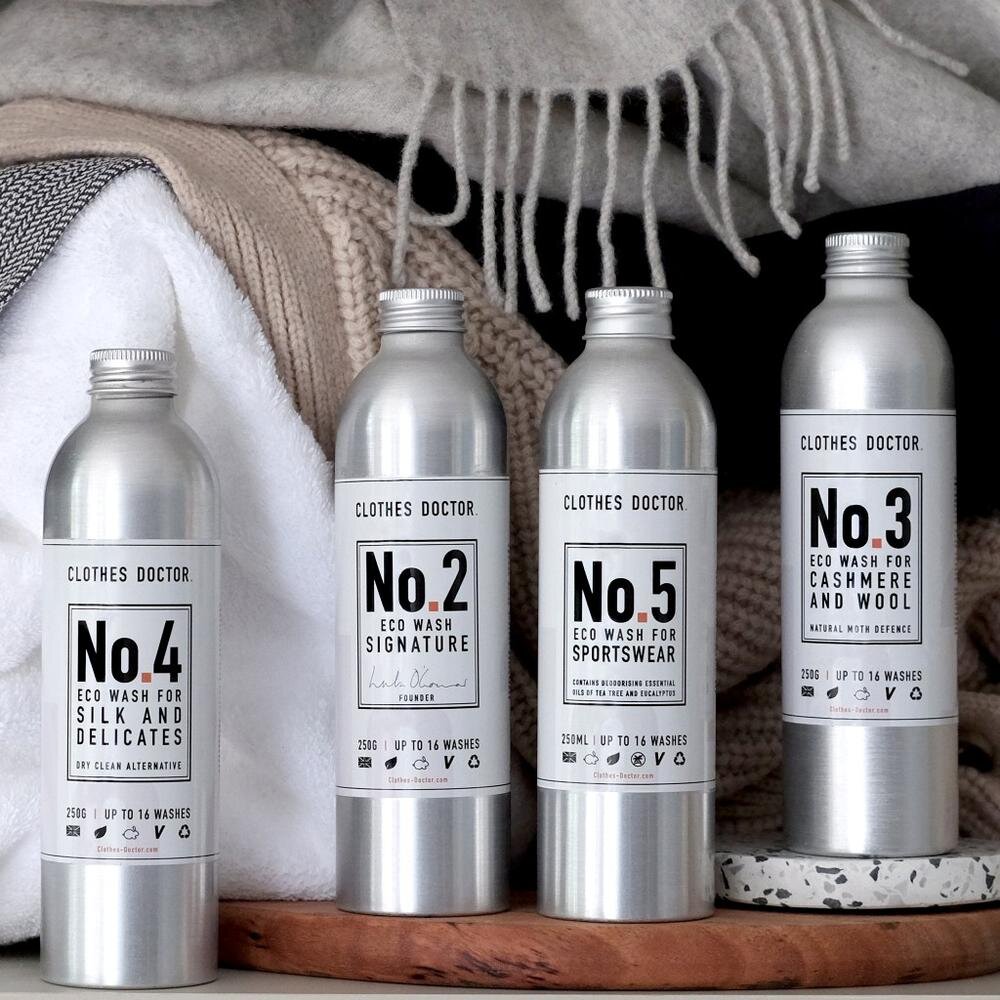Handle with Care: The Rise in Laundry Care Products and Clothing Repair Services
By Meg Pirie – Stylist and Slow-fashion Activist
In 1941, clothes were seen as a valuable commodity, and even widely rationed, when manufacturers were taken over for the war efforts. Repairing and renovating clothes became increasingly important as few could afford to buy new. The government set up ‘The Make-do and Mend' national campaign to encourage people to get as much wear as possible from the few items they did own. Evening classes were even held to educate people on how to make the most of their clothes, rather than throwing them out.
But the practice of mending clothes was made obsolete when mass-produced clothing— or fast-fashion, as we know it— became readily available towards the end of the 20th century. Our collective relationship to clothing changed, giving the industry a sense of impermanence. The increased availability of mass-produced clothes, sold at a fraction of the cost, has upheld a throw-away society where people continually replace clothes, rather than mending and caring for them.
Climate activists have warned for some time that fashion’s biggest sources of emissions are hidden deep in the fashion supply chain. This, coupled with the disposable nature of clothes today, has resulted in an industry plagued with environmental and social injustices. With this in mind, consumers are now trending far more towards sustainable-fashion consumption and longevity. A 2021 report by Deloitte, showed that 42% of those interviewed were looking for greater clarity on how to renew or repair items from brands, illustrating an increased trend in ownership and responsibility from consumers. Many companies have jumped on the chance to offer fashionable laundry and care products, which has been complemented by a surge in mending and repair services.
Clothes Doctor is a platform which helps consumers extend the life of their clothes, through subscription boxes, laundry and cleaning products to online repair tutorials. The platform— backed by Fashion Revolution’s founder Orsola de Castro— feels more like a movement than a brand, and hopes to move consumers away from environmentally damaging dry-cleaning, to care for and clean items at home instead.
Likewise, The Lab Co. is a laundry care product company creating products that are natural, vegan and biodegradable. Stepping away from the petroleum normally found in products in supermarkets, their formulas combine advanced enzymes with bio based ingredients to create the best eco cleaning technology. Unlike man-made ingredients, these ingredients are sourced from nature (like coconut) and biodegrade by dissolving in water. This helps to prolong your fabrics life, and will be beneficial to people who have sensitive skin.
While Stockholm-based clothing care company Steamery have completely modernised clothing care with Instagrammable steamers in a range of pastel hues, fabric shavers and laundry detergents. Extending a garment’s lifecycle is at the core of its messaging, with helpful tips and experts on-hand to advise.
Meanwhile the London-based repair service The Restory have also capitalised on this shift, branding themselves the ‘Net-a-Porter of after-care for luxury fashion’. They offer a collect and repair service for luxury items, with clients such as Adwoa Aboah and Lucy Siegle already big fans. Department store Harrods have already collaborated and a global brand partnership is rumoured at the end of the year.
In the narrowest sense, repairing a garment extends its lifecycle, but there are some textile artists who have been pushing this and what it means for decades— it’s about honouring the garment, reinventing and transforming to make it into something beautiful, not just maintaining its current condition. Tom van Deijnen, also known as Tom of Holland, is a Brighton-based textile artist at the forefront of the repair movement and does skilful and decorative mending by hand. His latest collaboration with TOAST, a British Lifestyle Brand originally founded in Swansea, Wales, saw him reimagine a selection of deadstock shirts, using silk threads and rows of intricate hand-stitch.
“I want to show people how mending can be beautiful and creative. Keeping clothes in active wear for longer, and therefore buying fewer items, is a simple way anybody can have a positive impact on the environment.” – Tom van Deijnen
More and more, it feels like brands who aren’t operating in this way, with clear guidance on caring for the clothes they make, risk alienating sustainability-driven consumers. As the Ellen McArthur Foundation points out, £500 billion is lost due to under-utilised clothes every year. Repair and care services clearly have potential to tap into this significant revenue as consumers move to handle their garments with care.



